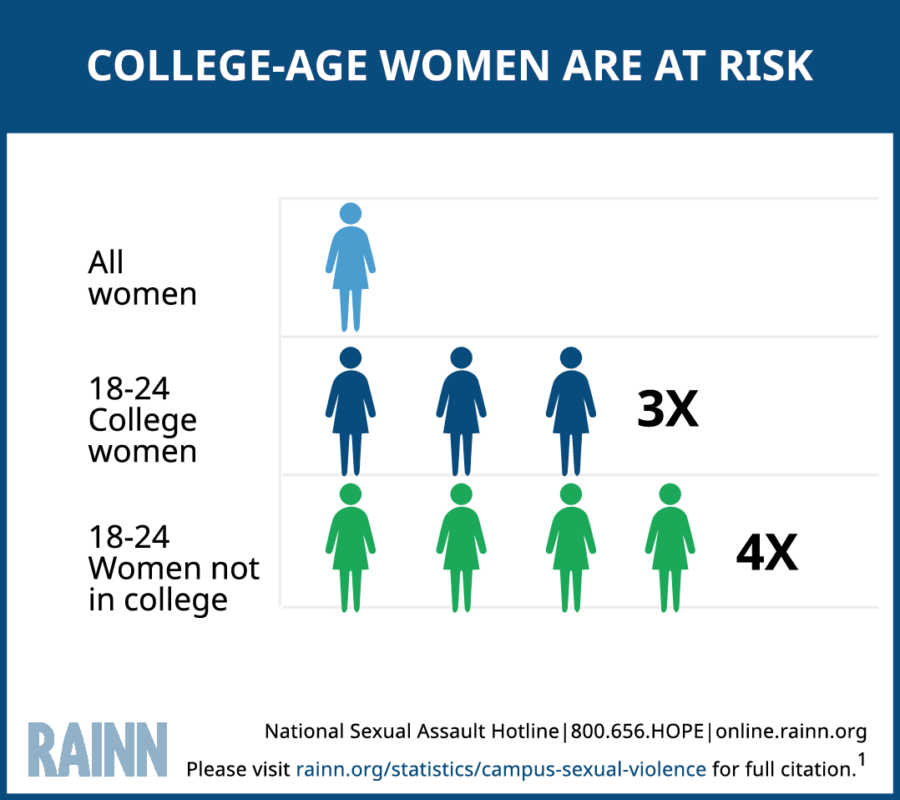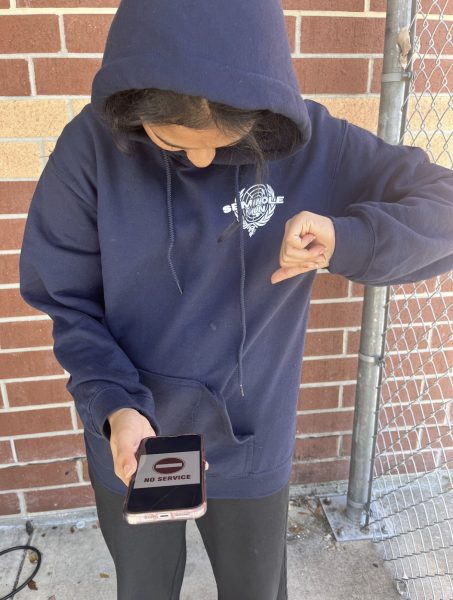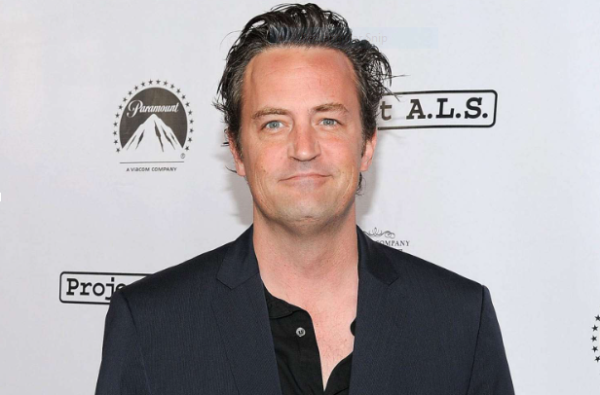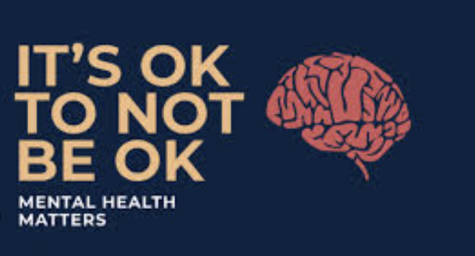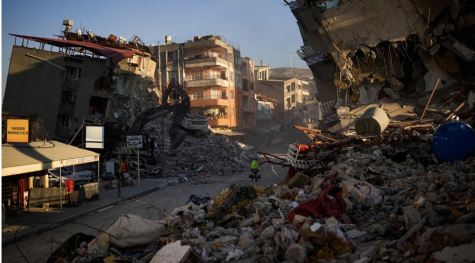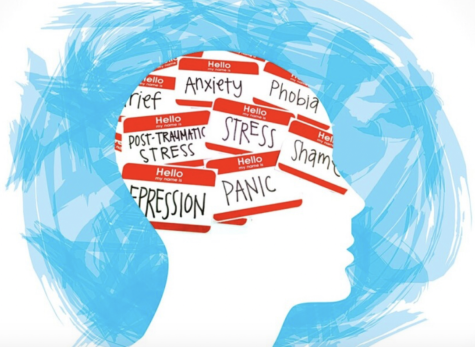SEXUAL ASSAULT AT ALARMING RATES IN COLLEGE AND UNIVERSITY CAMPUSES:
November 21, 2019
“I once saw a girl getting kidnapped near the University of Tampa and that traumatized me a lot. You hear about these dangerous instances but it is different when we witness [them] first hand.” said senior Aya Hassan. This is only one of many campus sexual assault stories.
Defining Sexual Assault:
The United States Department of Justice legally defines sexual assault as “any type of sexual contact or behavior that occurs without the explicit consent of the recipient.” Some note that the definition can serve as umbrella term, inexplicitely including vile actions such as, but not limited to, verbal harassment, attempted rape, rape, groping, fondling, intimate partner/marital assault, incestual assault, drug or alcohol-facilitated assault, multiple perpetrator/abetted assault, and many others. Some express that any non-consensual induced action is considered a form of this inappropriate behavior. With loose regulations and differing state laws, cases of non-consensual intercourse can be “swept under the bus,” often making victims fall silent, many of whom are college students. The sexual assault rates in college campuses are at an all time high, alarming many students, insituting the rise of social movements, causing students to take precaution and action, and calling into question the practicality of the imposed Title IX.
“Anytime someone feels uncomfortable or anything with no consent is what I define as sexual assault,” said an anonymous student.
The Hard Statistics:
The hard statistics are appalling to hear. Campus sexual assault rates are at an all time high, with reports only rising. The Rape, Abuse & Incest National Network (RAINN) estimates individuals in the age range of 18-24 enrolled in a college or university have an increased risk of being succumbed to sexual assault. Several networks have conducted research and discovered around 25% of women and 5% of men in a campus experience some form of sexual assault. This rate today has increased significantly and raised fears amongst students and concerned parents. Moreover, the LGBTQ+ community experience cases at an alarming rate as well; the individuals often targeted are those who identify as transgender, non-binary, and/or non-conforming.
“It’s alarming to hear this, but very eye-opening. As a female, I always have to carry around that fear everywhere I [go], whether it be at night walking alone, or when I go to college next year, any place at any time,” said one anonymous student.
Safety: What to Avoid and How to take precaution
With reported cases at an alarming rate, it only seems sensible to take a series of precautions. Some precautious measurements can include carrying pepper spray, dubbed the ‘anti-rape device.’ Watch for spiked drinks that may cause one to succumb to an intoxicated assault unknowingly. Atleast 50% of sexual assault cases in campuses are alcohol induced. Moreover, it is important to inform others of your locations during critical instances. Sometimes saying “No” is not enough to stop someone who is forcing you into an uncomfortable position; learning self-defense can help give you enough time to run or call for help. As mentinoed earlier, unitentional touching may make another person uncomfortable and can be considered sexual assault. To ensure an activity is consensual, always ask for permission. If at any time you feel uncomfortable in a situation, try to resort back to your comfortable environment or yell for bystanders present.
The Silenced Victims:
Often, victims are silenced due to cultural taboos and/or societal standards. For example, Boys in their late teenage years are told to not show signs of vulnerability. With sexual assault rates also prevalant with males, men feel insecure to report anincident due to a fear of reduced masculinity or judgement. This is why males are statistically less likely to report any incidents involving assault oncampuses, placing themselves amongst the many silent victims. About 6.8% of undergraduate males report that they have experienced some form of nonconsensual touching; however, this does not account for the many whose voices were left unheard. Moreover, certain practices such as victim blaming, stereotypical assumptions, gender bias, and other socialtial and family factors can cause individuals to not report crimes.
“Everyone should feel safe and comfortable in the world to report instances because [harassment] is a growing problem that is constantly present.” said Junior Logan Bell.
The Rise of Social Movements such as #Metoo, #TimesUp, and #WhyIdidntreport :
Late 2017, Alyssa Milano tweeted out what would now be known as the genesis of a social movement denouncing the injustices and stigma around sexual assault victims.
“If you’ve been sexually harassed or assaulted write ‘me too’ as a reply to this tweet,” Milano tweeted.
Later that day, Milano’s hashtag was trending on Twitter with over 50,000 replies.
Others were quick to join Milano in her fight towards ending taboos around sexual assault and victims coming forward. Notable figures such as Gwyneth Paltrow, Lupita Nyongo, Rose McGowan, and many more publicly announced similar scenarios with Harvey Weinstein, a disgraced former film producer carrying at least 60 cases of alleged sexual misconduct. #Metoo sparked as a snowball effect, emphasizing the disgust of “big and powerful men” abusing the system.
“It was the perfect storm to happen and I feel really blessed I was the vessel, the messenger. I definitely think [it is] a standing in solidarity to all those who have been hurt,” expressed Milano in a later interview.
Milano did not ignite the #Metoo movement just to appeal to the film industry, she wanted this movement to cover all aspects of the field, including campus sexual assault, which cover the highest reports.
Betsy DeVoss’s push on Title IX, The Brock-Turner Case, and Believing Survivors:
Secretary of education Betsy DeVoss has been met with harsh criticism over her proposed Title IX changes. The developed title handled cases of campus sexual misconduct, largely different than former President Obama’s Administration policy, which called for a strict enforcement of any form of sexual assault. The newly proposed law will allow the accused to receive more protections under any investigative measures and reduced liability or sentencing. The investigative implementations proposed by DeVoss include “live hearings with cross-examinations…[making]all evidence in investigative proceedings available to both parties, and eliminat[ing] restrictions on parties’ rights to speak about allegations,” according to the Harvard Crimson. Harvard College later went on to critisize the Title IX implementation, indicating that their students opposed the revised definition of sexual assault and the required live cross-examination hearings. More colleges jumped on this bandwagon in order to protect their students and faculty.
“I think it’s an invasion of privacy to have published investigative hearings. I feel like they are trying to avoid the problem rather than act on it,” said one anonymous student.
In January 2015, Chanel Miller, previously known as Emily Doe, was raped behind a fraternity dumpster at Stanford University. This event would later lead to the infamous Brock-Turner Case. In her recently released memoir Know My Name, Miller details the traumatic incident and recounts the post-partum effects survivors face.
“I felt the snags of pieces getting caught, a sharp twinge when threads were plucked off my scalp. Pulling and pulling until the bag was stuffed to the brim with sticks and hair,” described Miller in her memoir.
With Miller and other victims like Christine Blasely Ford (the woman who testified against now appointed Supreme Court Justice Brett Kavanaugh’s misconduct) coming forward, many urge that survivors’ compelling words are what may call for stricter regulations and practices involving sexual assault cases.
In today’s day and age many are afraid because of increased violence, assaults, human trafficking, etc.. While sexual assault or harrasment is a harsh and a touching subject that most often avoided in school discussions, it is important to remeber the following:
- Agreeing in any kind of sexual activity does not mean consent to another kind of sexual activity, imply future consent.
- It is always better to ask if you are unsure to remain respectful and to ensure the other person are on the same page.
- If someone is unable to, in 100% consciousness to give consent, do NOT assume they are giving consent.
- Reach out if you feel unsafe and always be aware of your surroundings: who you accept food/drinks from and let your friends/family know of your location at all times for safety purposes.
To report any sexual assault instances or to seek assistance call 800.656.4673
























